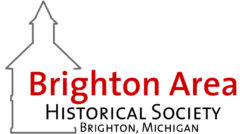Ben Cushing built the Brighton Hotel on the NE corner of Grand River and Main Street, in 1850, at the time of the completion of the planked toll road connecting Detroit with the newly built capital at Lansing. A continual procession of teams and vehicles traversed the road in both directions. Brighton at the half way point became a popular stop for refreshment, both solid and liquid.
The Brighton Hotel (after the coming of the railroad and the building of the Western House, 1873 on Main Street by the tracks, the name became Eastern House) had been designed to serve the community as well as the traveling public. A room on the second floor was especially constructed for square dancing. Its floor joists were laid in a manner that would allow the floor to spring with the rhythm of the dancing. The verandas along the front and one side provided cover and shade for those waiting or just loafing on the benches furnished.
Following Ben Cushings death in 1860, others ran the business until Fred and Will Sturhberg, who had been raised on their fathers (a blacksmith) small farm located just across Grand River from the hotel at what is now St. Paul St., became proprietors.
Enterprising and energetic men of good reputation, the brothers kept the hotel (eight guest rooms) in good repair and added improvements, including telephone and electricity when these became available. A Windmill was erected and an elevated tank suppatched to the depot to meet travelers for transport to the Eastern House. The large livery barn erected east of the hotel also operated as a drive-in 10¢ (including hay) barn to house rigs in inclement weather. Students at the local high school also left their horses during school hours. The hotel served three meals from foodstuffs grown and preserved by the proprietors. Practically self-sustaining, only sugar, flour, spices, coffee, etc. were purchased.
The hardworking Sturhbergs prospered; engaging in buying, selling and trading horses, they also stocked wagons, sleighs, buggies, carts, cutters, robes, house blankets and harnesses. After Freds accidental death on one of their several farms, his wife Mary (Winklehaus) and Will continued to operate the hotel. In 1926 the hotel burned.
Various businesses operated on the premises until the area was cleared for a parking lot for a food market and a drug store.
Condensed from A Scrap Book of Michigan Memorabelia by Wm. Pless and a program presented to the Brighton Area Historical Society May 10, 1983 by Katherine Sturhberg Hampton.
